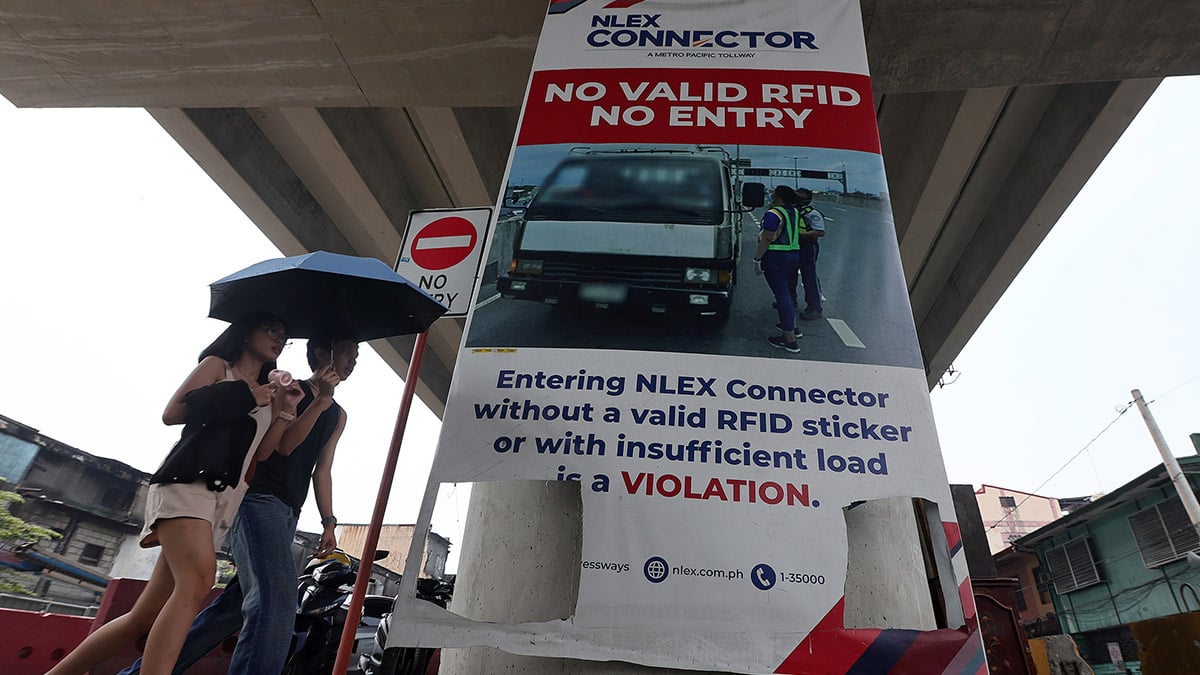New tollway rules moved to Oct. 1

ON HOLD The Aug. 31 implementation of the “No RFID, No Entry” rule, as stated in this sign at the España ramp of the NLEx connector in Manila, has been postponed following objections from motorists. Photo taken on Aug. 26. —Grig C. Montegrande
MANILA, Philippines — The Department of Transportation has postponed to Oct. 1 the implementation of new regulations that will ban vehicles without electronic toll collection (ETC) devices from traveling on toll expressways and penalize those with insufficient load balance.
The revised guidelines, contained in Joint Memorandum Circular (JMC) No. 2024-001 signed last Aug. 1 by Transportation Secretary Jaime Bautista, Land Transportation Office (LTO) chief Vigor Mendoza II, and Executive Director Alvin Carullo of the Toll Regulatory Board (TRB), was originally scheduled for implementation on Aug. 31.
READ: Fines await those without RFID, with insufficient load by Aug. 31
Bautista on Tuesday said the decision was to give tollroad operators time to improve their services.
The plan drew flak from motorists who argued that the bottlenecks at the toll booths were caused by faulty readers of radio frequency identification (RFID) stickers, the ETC type that local tollways use.
Article continues after this advertisementREAD: Prove RFID devices reliability before fining drivers – Poe
Article continues after this advertisement“We hope the concerned agencies and tollway operators would use the 30-day deferment to fine-tune expressway operations and further intensify the public information campaign to enable tollway users to comply with the new guidelines,” Bautista said in a statement.
No device, no entry
Under the JMC, motorists who violate the “No ETC Device, No Entry” rule will be fined P1,000 for the first offense, P2,000 for the second, and P2,500 for each subsequent offense. Those who violate the “No Sufficient Load, No Entry” rule will be fined P500 for the first offense, P1,000 for the second, and P2,500 for each subsequent offense.
The use of fraudulent, tampered, or fake ETC devices and e-cards is punishable by P1,000 for the first offense, P2,000 for the second, and P5,000 per subsequent offense.
‘Flawed, unjust’ circular
The circular also authorizes the LTO to deputy tollway enforcers employed by tollway concessionaires to implement the new guidelines.
Bautista said the new rules “should significantly improve traffic along expressways through cashless or contactless toll plazas.”
The transport chief appealed for support from tollway users by complying with the provisions of the JMC.
However, labor and transport groups pressed their call for the revocation of the JMC, pointing out that the cash payment option should be still available to motorists who do not use the tollways regularly.
In a letter to President Ferdinand Marcos Jr. sent on Tuesday, the Nagkaisa Labor Coalition, through its president Sonny Matula, called for the JMC to be “completely scrapped as it remains fundamentally flawed and unjust.”
The group said the penalties were discriminatory as these punish motorists who do not use the tollways regularly or who have simply forgotten to check their RFID loads, and the fines will add to the financial burden of travelers from the provinces who rarely go to urban areas where tollways are mostly found.
Suggested priorities
Lawyer Nicasio Conti, convener of Click Partylist and former member of the Presidential Commission on Good Government and the Presidential Anti-Graft Commission, called on the TRB to prioritize the modernization of toll collection systems before imposing penalties on motorists.
“The persistent congestion on our toll roads, especially in Metro Manila, is largely due to defective RFID readers and the lack of a uniform payment system across various tollway concessionaires,” Conti said.
The BTS Bayaning Tsuper Party-list group agreed that the problems of the RFID system must be fixed first, such as improved access to RFID loading and balance viewing, as well as faster RFID reading to avoid long queues in toll gates.
In a statement, the group lamented that the TRB has yet to implement the “interoperability” it promised for the Easytrip and Autosweep RFID services on tollways.
The TRB, for its part, said they would make sure the toll plazas have a 98-percent RFID readability rate for all motorists passing through the expressways.